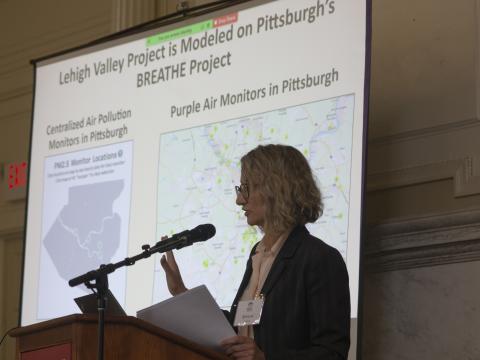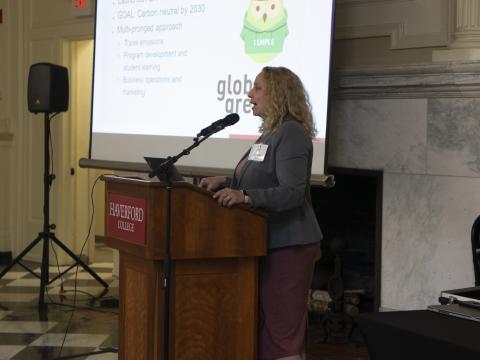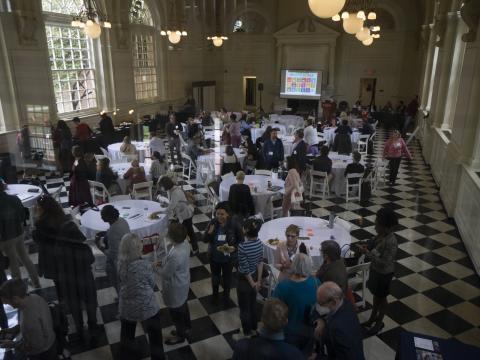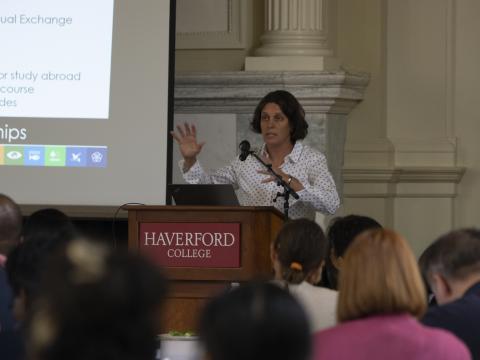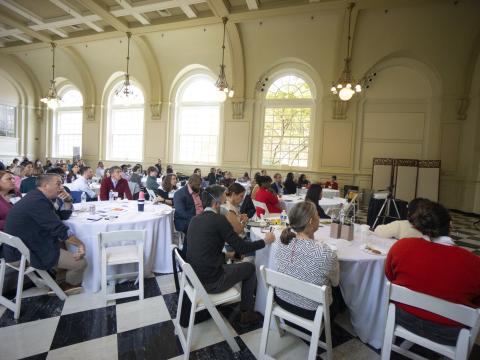CPGC, College Host State-wide Conversation on Sustainability and Global Learning

Pictured: Breena Holland, Associate Professor of Political Science at Lehigh University, presented on community-engaged air pollution monitoring in Bethlehem
Details
The CPGC hosted the Pennsylvania Council for International Education’s annual conference at Haverford. Attendees were invited to a number of plenaries and workshops over the two-day conference, where they explored the theme of building a more just, inclusive, global Pennsylvania.
On Friday, September 30, at Haverford College, the lunchtime plenary panel of the PA Council for International Education (PACIE) united global and environmental learning, responding to the question, “What do Sustainability and Sustainable Development Goals have to do with Global Learning and Local Action?”. Panelists were introduced by Eliada Griffin-El, Associate Professor of Management at Robert Morris University and Executive Director of the Massey Center for Entrepreneurship and Innovation.
Full recording of plenary available here.
Dickinson College Director of Sustainability Learning Lindsey Lyons opened by discussing the importance of applying the UN Sustainable Development Goals (SDG) in education, and how Dickinson College has integrated this with their carbon-neutral campus, and on study abroad through sustainable travel. She explained that the SDGs allow for “a nice, easy, holistic entry point for people in international education, global education, community work, and sustainability to see their piece in the bigger picture”. Lyons shared how the SDGs allow institutions to create connections across campuses and beyond, creating partnerships that utilize the SDGs.
Kate Manni, the Director of Education Abroad at Penn State University, discussed why it is important to link the SDGs to global learning. Manni then looked back on how Penn State's study abroad program was changed in light of the pandemic, which led her team to adapt study abroad programs to be more sustainable through incorporating the SDGs. After a brainstorming session in 2020, her team explored new operational improvements, virtual experiences at Penn State, and making travel more sustainable for in-person study abroad. She concludes her presentation by providing suggestions on how to understand how sustainable your institution is by drawing on the AASHE Stars Report.
Breena Holland, Associate Professor of Political Science at Lehigh University, presented her work on community-engaged air pollution monitoring and how that can be connected to broader global initiatives in regard to environmental sustainability. Working carefully with community members and partners including an 8th Grade Science Class, Holland took on the project of air quality in Bethlehem, PA, where contemporary sources of pollution, such as the trucking industry, make pollution less visible. Holland led two projects to combat this issue: a black carbon air monitoring project and her current project, community air monitoring to assess distribution of air pollution. Holland concludes her presentation by discussing the importance of local knowledge in achieving the SDGs.
Suzanne Willever, Associate Director for Outreach and Academics at Temple University’s Education Abroad and Overseas Campuses, started the Temple Global Green initiative in April of 2022, with the goal of being completely carbon neutral by 2030. This project focused on reducing travel emissions, new program developments and student learning, and business operations and marketing. Willever shared how she reached out to sustainability experts and students on campus to speak on International Education Week Panels in 2021. Panellists created blogs and published articles after the event, and Temple educators continued to post videos to help students become more sustainable. Global Green also introduced grants for students studying abroad to implement sustainability projects. Temple plans to commit to a sustainability pledge for the Spring of 2023, which requires students and faculty to sign as a way to create accountability and raise awareness. Lastly, as of April 2022, the Global Green Website was launched as a resource available for students regarding Temple’s engagement in sustainability. Willever concluded her presentation by offering the following tips to help others start their own green initiatives: start small, engage your students, find partners, refuse marketing materials, and make it central to your mission.
The last presentation was given by Stephanie Zukerman, the International Programs Manager at Haverford College’s Center for Peace and Global Citizenship, and Jonathan Wilson, Associate Professor of Environmental Studies at the College. Their presentation discussed a short-term, 10-day field study in Trinidad and Tobago that is focused on botany, culture, and history, which will run for the 4th time in March 2023. Zukerman and Wilson shared a clip of a film created by Haverford film students who attended the 2018 trip, which explained the trip from a student’s perspective. The collaborative field study combines environmental foci with culture and history, including opportunities to learn about and experience cacao cultivation, biodiversity, ecology and ecotourism, and the culture and communities of Trinidad and Tobago. Students actively engage in the science and culture within Trinidad and Tobago through various activities and visits, including Green Market Santa Cruz and the University of West Indies Cocoa Research Center. Students were given the opportunity to meet Trinidadian experts Jason Radix, one of the top naturalists in the world, and Dr. Rita Pemberton, the former chair of the history department at the University of West Indies, as well as visiting cultural sites such as the Hindu temples. Wilson and Zukerman discussed the long-term impact the trip has had on students' futures and the takeaways that both they and their students have had from the experience.

